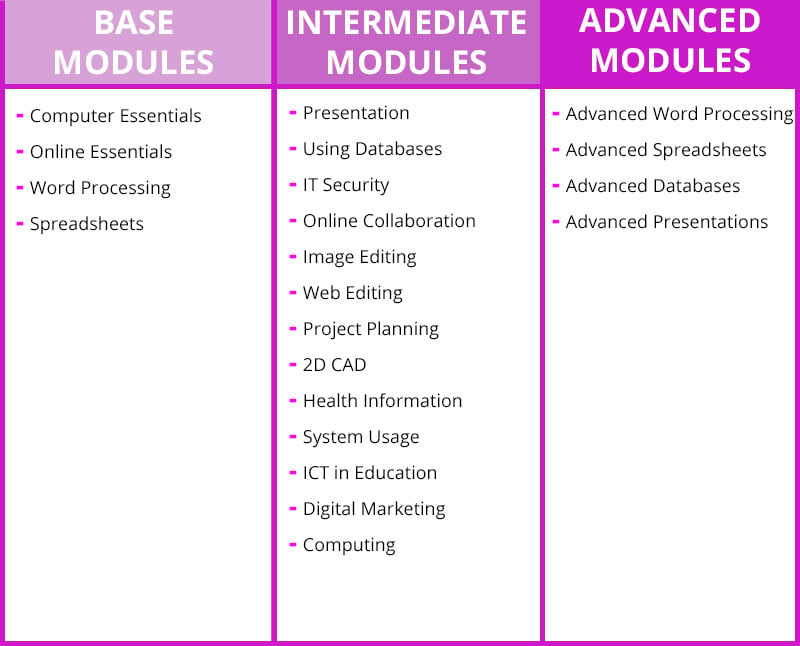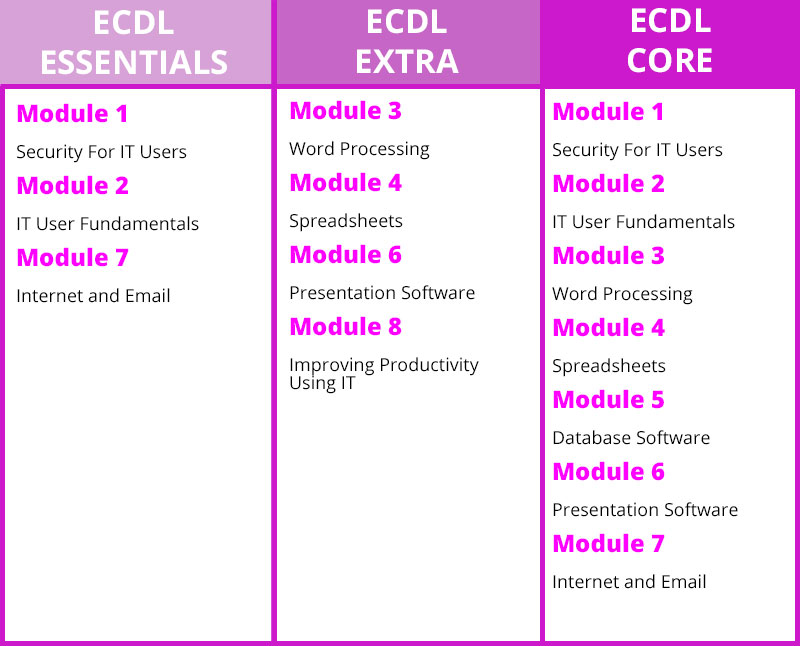
Think you’re good with computers? You might be surprised…
Although most of us use tech on a daily basis, many of us don’t have a formal qualification to prove our level of ability. So how can you show employers how IT literate you are? Luckily, there’s a globally recognised course designed to do exactly that.
If you’re looking to expand your knowledge, here’s everything you need to know about ECDL:
What does ECDL stand for?
ECDL stands for the European Computer Driving License (ECDL).
What is ECDL?
ECDL is a worldwide recognised computer literacy certification programme.
It provides students with the IT skills and abilities needed to build on existing knowledge, motivate further learning, and improve their employability in a wide range of fields and industries.
It’s accredited by the Chartered Institute of IT (BCS) as an ITQ and is classed as a flexible qualification.
New ECDL
Introduced in 2013, the new ECDL framework is split over three levels, with a total of 18 modules. These include:
- Base modules. Teaches fundamental tech skills, including computer and online essentials, as well as word processing and spreadsheets.
- Intermediate modules. This level has nine modules to choose from, which teach everything from databases and IT security, to image/web editing and digital marketing.It’s classed as the equivalent to a GCSE A*-C.
- Advanced modules. Allows students to build on basic skills, with modules based around advanced word processing, spreadsheets, database, and presentation. It’s classed as the equivalent to an A level.
Each module counts as its own qualification – and although the modules you pick are entirely up to you, there are 3 recommended combinations designed to suit different skill levels, interests, and needs.
These include:
- Base profile. Includes 4 base modules.
- Standard profile (equivalent to a GCSE A*-C). Includes 4 base modules and 3 intermediate modules.
- Expert profile (equivalent to an A level). Includes 4 advanced modules.
All available modules are as follows:

Original ECDL
Although the syllabus has now changed, some providers may still use the previous format – which was made up of a total of 7 modules.
The syllabus is commonly broken down into the following units:
ECDL Essentials. This level 1 ITQ introduction to IT teaches the basics of computing – including security for IT users (module 1), IT user fundamentals (module 2), and internet and email (module 7).
ECDL Extra. Builds on basic knowledge, and helps to improve students’ understanding of a variety of software packages – as well as improving productivity using IT (module 8). The course also includes word processing (module 3), spreadsheets (module 4), and presentations (module 6), and is a level 2 ITQ award.
ECDL Core. This course includes modules 1-7, teaching everything from word processing to database software.As it is the most comprehensive unit, it’s recognised by employers as proof of IT competency.
Each unit consists of:

What is ICDL?
ICDL is what ECDL is referred to outside of Europe, and stands for International Computer Driving License.
The course contents and qualification are equivalent to each other.
Are there any entry requirements to study ECDL?
There are no specific entry requirements to study ECDL.
You can be any age, and all you need is a basic understanding of computers and an enthusiasm to learn.
So whether you want to study it alongside your GCSEs, you need specific IT competencies for career progression, or you’re just looking to quantify your IT skills – an ECDL qualification is well within your reach.
What are the benefits of gaining an ECDL?
Over 14 million people have enrolled on an ECDL course, proving it a popular way to gain and develop essential IT skills.
If you’re wondering whether an ECDL is right for you, here are a few of the key benefits of studying:
- It’s the world’s leading computer skills programme
- It offers a flexible working programme, allowing you to pick the topics suitable to your needs
- It requires no previous expertise
- It’s widely recognised by employers
- It could open up new opportunities
Can I study ECDL online?
You can usually study ECDL online, although some providers may offer classroom courses.
If you’re studying from home, support will normally be available via email – and you may need to go to a testing centre to take your exams.
For more specific details on where you’ll take the course, simply check with the provider directly.
Ready to start learning? View all available ECDL courses now





